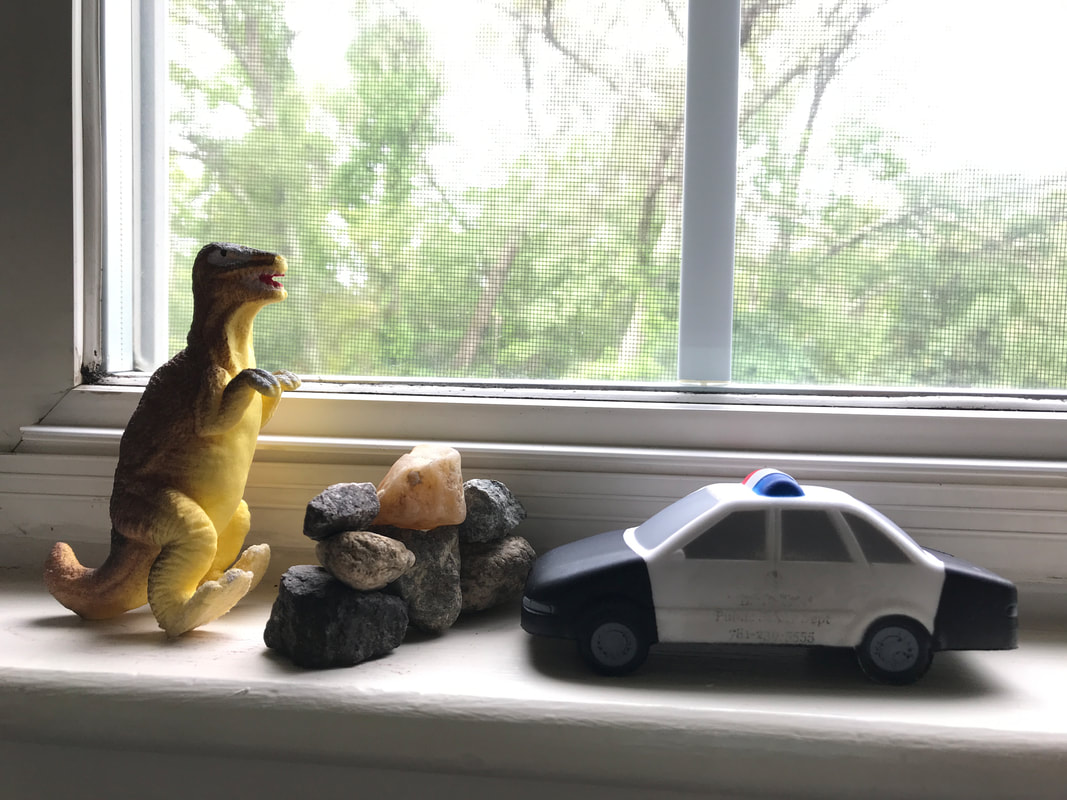|
Today was a typical Saturday morning. I went for a run, tidied up the house and had breakfast. James asked if I would play with him and of course I said yes. We went up to his room, read a few stories and talked about his first week of kindergarten. He then got a big smile on his face and announced that he wanted to play cops and robbers! I felt a twinge inside of me. "Ugh, really?" I thought to myself. I immediately started to try to rationalize it in my head. What boy doesn't want to play cops and robbers? It's okay, isn't it? Society tells me that it's harmless and that it's normal. Surely I'm just overreacting? Deep down I knew I wasn't overreacting. I had just spent the past week watching films for my human rights class about the systematic root cause of the culture of male violence, bullying, sexism, discrimination and powers of oppression. What I found out was that it is all learned behavior. Boys are taught that they need to be tough, aggressive and suppress their emotions or they risk being shamed. This gender stereotyping is perpetuated every day by the way we talk to our children and what our expectations are of them. We even see it in movies where males are portrayed as tough and often have to fight to show dominance. Phrases like "boys will be boys," "man up," or even "boys don't cry" are not helpful and only further perpetuate systematic oppression. As Jackson Katz explained in his film, Tough Guise 2, we are a "culture that romanticizes violent masculinity" (Katz, Tough guise 2). So what do I do? How is a mom supposed to let her son play and use his imagination but weave these very important messages (that often counteract societal norms) into his life? It dawned on me, I could do this through play. Instead of saying to my son that we couldn't play cops and robbers, I simply turned play into a teachable moment. I wanted to break the idea that there are good guys and that there are bad guys. I wanted to stop the us vs. them mentality that my five-year-old had already developed. Instead, I wanted to show him that we have the opportunity to look at the individual and to hear their story instead of relying on biases and false generalizations. Here's how it played out: James (As the Police Car): Let's play cops and robbers! Wee oooo weee oooo, stop right there, robber! Me (As the Dinosaur): Oh no! Why are you coming after me? James (As the Police Car): Because you just robbed the bank! You belong in jail! This is where I started asking the probing questions: Me: Why do you think the dinosaur needed to rob the bank? James: Because he is mean and needed money! Me: Why do you think he was being mean? James: Hmm, maybe because he has no friends. Me: Oh, I see. How do you think that makes the dinosaur feel? James: Sad, really sad. Me: Yes, I can understand that. What do you think you could do to make him feel better? James: We give him money. Me: That's an interesting idea. Do you think that would solve his problems? James: Hmm, maybe not. Maybe the police man could help the dinosaur out instead of putting him in jail? This is where we went back to playing: James (As the Police Car): Oh hi dinosaur! You don't need to rob the bank. Let's talk about it. Want to be friends? Me (As the Dinosaur): Oh yes, thank you! I was feeling so lonely. I really needed a friend. James (As the Police Car): Okay! We are friends now, let's go play! Although this is just a bit of imagination, it replicates what happens in our society. We go from step 1 to 10 and miss all of the steps in between. Those in between steps are the good stuff. That is where we learn, we break down barriers, we confront our biases, and we learn how to empathize and show compassion. Perhaps the next time James decides to play cops and robbers with a friend or a classmate, he too can ask these thought provoking questions that can open the minds of his fellow peers. We need to stop "fighting" crime and start teaching kindness. This is how systematic change happens...grassroots and from the bottom up. We can teach our sweet, special, and wonderful boys that it is actually brave to have empathy and show compassion. For when they are older and find themselves in a position to either bully or befriend, I hope that they choose to befriend, as they will have learned the skills to act with courage and show kindness. So you see, lessons don't just happen in the classroom. They can happen everywhere. Look for those teachable moments that can change the hearts and minds of our children, who will later be the ones that will teach the future. If you're interested in films around these important themes, I suggest the following: Tough Guise 2 Bullied 13th Be well, Abby Katz, J. (2013). Tough guise 2: The ongoing crisis of violent masculinity [Video file].
4 Comments
Candace
9/8/2018 03:10:39 pm
I thank you for teaching me what you have been learning because it is never to late to learn....We are models, I always say children may not listen to us but they definitely duplicate our behaviors ....I try to remember that.
Reply
Abby Power
9/22/2018 07:35:41 pm
Candace, you are so right! Eye are always watching.
Reply
Chitra Golestani
10/1/2018 02:35:55 pm
It is so amazing to watch changemakers apply new concepts about non-violence seamlessly into parenting and educating others. Thank you for sharing this with all of us, Abby
Reply
Abby
10/3/2018 01:00:27 pm
Thank you for reading, Chitra!
Reply
Leave a Reply. |
BlogArchives
December 2019
Categories
All
|

 RSS Feed
RSS Feed
